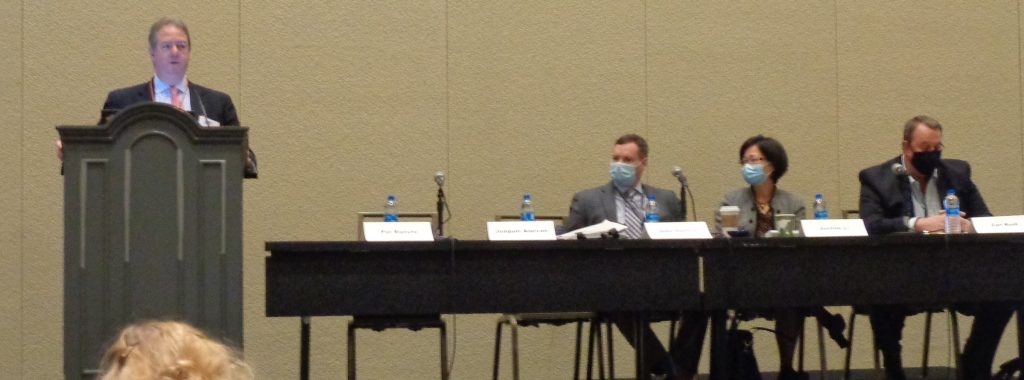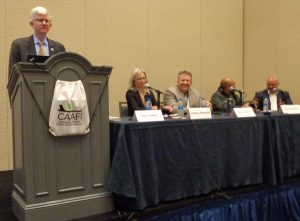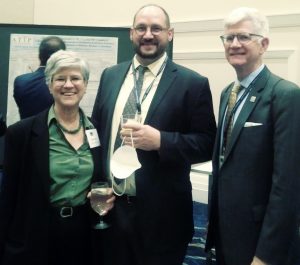by Joanne Ivancic* (Advanced Biofuels USA) One of the speakers on the second day of the Alternative Fuels & Chemicals Coalition’s Global Biobased Economy Conference & Exhibit, noted that 5 years ago the bioeconomy was like an old truck stuck in the mud. The driver could get out and try to push but the truck just kept spinning its wheels. Now, the speaker noted, the tow truck has arrived in the guise of Environmental, Social and Governance criteria tied to corporate officials’ compensation and other stockholder, investor and public pressure to institute sustainability programs.
 FACC Conference plenary session with Ling Hua (Clariant), Hugh Welsh (DSM), Pramod Chaudhari (Praj), Jeremy Baines (Neste) Roger Wyse (Spruce Capital Partners)
FACC Conference plenary session with Ling Hua (Clariant), Hugh Welsh (DSM), Pramod Chaudhari (Praj), Jeremy Baines (Neste) Roger Wyse (Spruce Capital Partners)
This sentiment was reinforced during the luncheon plenary session when high level representatives of Neste, Praj Industries, Clariant, and DSM confirmed that pressure on company officials. It was also evidenced by the increase in attendance by younger people, people new to the biofuels/biochemicals community and people investigating investment or financing opportunities.
Inside the Bioeconomy
The second day presented a firehose stream of inside bioeconomy information from sustainable aviation fuels to the latest in biobased, biodegradable and recyclable plastics; from examination of carbon intensity amplifying value, environmental benefits and consumer adoption to making renewable chemicals and biomaterials from bioethanol.
These presentations made clear that achieving governmental, corporate and personal sustainability goals will depend on chemicals and materials, not just fuel.
Paul Zorner of Bluejaune Advisors took that a step further, convinced that beyond carbon neutrality we need carbon drawdown; that we can do that by taking advantage of carbon in the air and converting it using agriculture.
Karen O’Brien of Gevo reinforced the idea of plants gathering that carbon so that it can be taken from field to carbon markets. She reminded the conference that this offered opportunities to capture carbon in durable consumer goods as well as in soil.
 Jay Golden (Syracuse University), Alex Ward (Origin Materials), Karen O'Brien (Gevo), Glenn Johnston (Nuseed), Paul Zorner (Bleujaune Advisors)
Jay Golden (Syracuse University), Alex Ward (Origin Materials), Karen O'Brien (Gevo), Glenn Johnston (Nuseed), Paul Zorner (Bleujaune Advisors)
Regulatory Tweeks and Updated Interpretations Needed to Bring RFS and Other Rules Up to Date
This panel also noted a quick fix in regulatory-related practices that should better reflect the realities of soil carbon sequestration. Glenn Johnston of Nuseed described the 2 ½ to 3 feet deep roots characteristic of carinata and the common practice of measuring soil carbon only in the top few inches of soil. This misses much of the part of the soil where deep-rooted crops like carinata deposit carbon captured from the atmosphere and carried into the dirt. This practice would also tend to miss carbon storage by other deep-rooted crops like energy beets.
Johnston was also concerned about the intensive schedule for testing of carbon soil related to carbon sequestration and carbon credit markets noting the heavy expense to farmers and the lack of adequate testing facilities that may together preclude participation in these programs. He suggests baseline testing followed by additional testing in 5 or 10 years to confirm results predicted by appropriate modeling.
This panel also discussed another handicap to biofuel production related to an outdated interpretation of regulations. For some reason growers can’t get credit for planting cover crops if the crop is harvested. The crop can be taken off the field and used for bedding and that is not considered “harvesting”. It can be used for foraging animals and still be considered a cover crop. But, if winter crops that are planted to serve as cover crops to improve soil condition, reduce water runoff and wind erosion, if those crops have oil seeds that are gathered for use for biofuel or biochemical feedstock and animal feed co-product, they are no longer considered cover crops. This negatively impacts farmers’ incentives to invest in this beneficial, climate smart, regenerative agriculture practice.
Overall, Johnston urged new modeling for carbon intensity and replacement of the current EPA Renewable Identification Number (RINs) pathway determination system. He noted that Nuseed works with growers in South America to sell carinata to the European Union market because their system of feedstock approval.
O’Brien brought up the role that blockchain can play in validating supply chain and carbon credit application. She acknowledged the high energy draw used by blockchain systems and suggested that there could be ways to make that less carbon intensive.
The suggestion that renewable fuels could provide solutions to dangers exacerbated by climate change if only regulatory interpretations dating back to a decade or more were simply updated was initially raised by Julie Tucker during the U.S. Department of Agriculture Leadership briefings on Sunday. She suggested that “biomass from areas at risk of wildfire” in Environmental Protection Agency regulations should reflect USDA maps showing areas at risk of wildfire. What a thought.
Such regulatory changes could motivate companies like Red Rock Biofuels in Oregon to use feedstock gleaned from accepted and effective forest management practices such as pre-commercial thinning on federal forest lands, and collection of slash that feeds forest fires on federal land unnecessarily.
 Biochem from Bioethanol panel: Joaquin Alarcon (Catalyxx), John Hannon (Vertimass), Justine Li (ADM), Carl Rush (Viridis Chemical)
Biochem from Bioethanol panel: Joaquin Alarcon (Catalyxx), John Hannon (Vertimass), Justine Li (ADM), Carl Rush (Viridis Chemical)
Other issues in the Firehose
How to compensate farmers for carbon capture and storage and climate smart agriculture practices? Nuseed pays farmers a set amount additional per acre depending of extra climate smart practices they employ such as spreading manure as soil amendment rather than making them bear the cost of such practices while they wait for uncertain carbon market compensation.
With regard to carbon markets based on agricultural practices, the panel discussed how some concepts such as additionality and permanence should give way to concepts like resistance and modeling, talking about how nature wants to cycle and resists carbon going back into the atmosphere. Why punish someone for doing something for 20 years by not letting them participate in carbon markets?
Conversely, current farmers may not be on that land four or ten years from now, so they are reluctant to contract to accept responsibility for continued carbon sequestration. The question was raised, who is responsible? Often land is leased by farmers; and not infrequently from absentee landlords, including those just parking funds with US land purchases who have no concern for improving soil quality or capturing carbon.
Alex Ward of Origin Materials brought up lower carbon footprint vehicles with components such as foams, tires, and other parts of the structure presenting huge markets that store carbon in these products. There should be a demand goal with stronger US government preference in the $400 Billion procurement for nonfossil-based materials; there should more government consumer pull, trendsetters for using biobased materials.
High feedstock prices and the complaint of lack of oil-based feedstock came up. Johnston had some strong opinions starting with a concern that there is not a feedstock shortage, just multiple policy roadblocks. High prices, he noted, are the solution for high prices. Getting carbon pricing where it needs to be to get climate smart practices could be an answer.
A session on biochemicals from bioethanol noted that with some chemicals selling for $3-5,000/ton the value of ethanol increases significantly by turning it into chemicals.
Some ethanol-to-chemical producers and some fuels and biochemical producers swore that they could make products competitive with fossil-based competitors; others admitted that they expected to rely on government incentives and some hoped low carbon fuel standards might be expanded to include bio-based chemicals.
 SAF Panel: Chris Tindal (CAAFI), Lindsay Fitzgerald (Gevo), Dave Kettner (Virent), John Kuruvilla (Southwest), Andrew Miller (Velocys)
SAF Panel: Chris Tindal (CAAFI), Lindsay Fitzgerald (Gevo), Dave Kettner (Virent), John Kuruvilla (Southwest), Andrew Miller (Velocys)
John Hannon from Vertimass got a chance in two different sessions to talk about how their bio-aeromatics process applies to chemical markets as well as to fuel markets as renewable gasoline or, in combination with other processes such as HEFA and the LanzaJet alcohol-to-jet process, to make 100% sustainable aviation fuel. They are working through the ASTM process with this fuel blend.
A few sessions got into carbon capture and sequestration of the carbon removed from the atmosphere by photosynthesis. Released by fermentation and captured for underground storage as illustrated by the ADM facility in Illinois; or by storing in consumer goods such as plastics, it’s clear that this aspect of renewable fuels and chemicals production needs more exploration and public education.
The ever-present plea for consistent long-term policy instead of administration-reliant practices raised its head repeatedly.
CAAFI’s Chris Tindal raised the question for a SAF panel of whether the goals for 2030 and 2050 in the Biden Administration’s Sustainable Aviation Fuel Grand Challenge were feasible. He noted that the US would have to double consumption of SAF every year for next 8 years to meet the 3 Billion gallons/year goal and would have to scurry to achieve the 35 billion gallon/year goal for 2050.
 Advanced Biofuels USA board members Joanne Ivancic, Todd Campbell and Chris Tindal got together at the FACC conference reception.
Advanced Biofuels USA board members Joanne Ivancic, Todd Campbell and Chris Tindal got together at the FACC conference reception.
Participants on the panel generally agree that is good to have stretch goals. Gevo could commit to producing 1 of those billions of gallons/year by 2030. Virent and Velocys thought it was possible to meet the goals; but maybe not quite on time due to how long it might take for practical things like getting permits, financing and construction and commissioning completed.
This summary only scratches the surface of the topics covered in the three tracks and plenary sessions so far.
A final thought struck me. So much hangs on agriculture to get the economy to net zero; we should be very nice to farmers, maybe even invite some to these meetings to give their perspectives on the burden that is resting on their shoulders and what they intend to do about it.
*Joanne Ivancic serves as the executive director of Advanced Biofuels USA.
Nearly 55,000 articles in our online library!
Use the categories and tags listed below to access the nearly 50,000 articles indexed on this website.
Advanced Biofuels USA Policy Statements and Handouts!
- For Kids: Carbon Cycle Puzzle Page
- Why Ethanol? Why E85?
- Just A Minute 3-5 Minute Educational Videos
- 30/30 Online Presentations
- “Disappearing” Carbon Tax for Non-Renewable Fuels
- What’s the Difference between Biodiesel and Renewable (Green) Diesel? 2020 revision
- How to De-Fossilize Your Fleet: Suggestions for Fleet Managers Working on Sustainability Programs
- New Engine Technologies Could Produce Similar Mileage for All Ethanol Fuel Mixtures
- Action Plan for a Sustainable Advanced Biofuel Economy
- The Interaction of the Clean Air Act, California’s CAA Waiver, Corporate Average Fuel Economy Standards, Renewable Fuel Standards and California’s Low Carbon Fuel Standard
- Latest Data on Fuel Mileage and GHG Benefits of E30
- What Can I Do?
Donate
DonateARCHIVES
- February 2026
- January 2026
- December 2025
- November 2025
- October 2025
- September 2025
- August 2025
- July 2025
- June 2025
- May 2025
- April 2025
- March 2025
- February 2025
- January 2025
- December 2024
- November 2024
- October 2024
- September 2024
- August 2024
- July 2024
- June 2024
- May 2024
- April 2024
- March 2024
- February 2024
- January 2024
- December 2023
- November 2023
- October 2023
- September 2023
- August 2023
- July 2023
- June 2023
- May 2023
- April 2023
- March 2023
- February 2023
- January 2023
- December 2022
- November 2022
- October 2022
- September 2022
- August 2022
- July 2022
- June 2022
- May 2022
- April 2022
- March 2022
- February 2022
- January 2022
- December 2021
- November 2021
- October 2021
- September 2021
- August 2021
- July 2021
- June 2021
- May 2021
- April 2021
- March 2021
- February 2021
- January 2021
- December 2020
- November 2020
- October 2020
- September 2020
- August 2020
- July 2020
- June 2020
- May 2020
- April 2020
- March 2020
- February 2020
- January 2020
- December 2019
- November 2019
- October 2019
- September 2019
- August 2019
- July 2019
- June 2019
- May 2019
- April 2019
- March 2019
- February 2019
- January 2019
- December 2018
- November 2018
- October 2018
- September 2018
- August 2018
- July 2018
- June 2018
- May 2018
- April 2018
- March 2018
- February 2018
- January 2018
- December 2017
- November 2017
- October 2017
- September 2017
- August 2017
- July 2017
- June 2017
- May 2017
- April 2017
- March 2017
- February 2017
- January 2017
- December 2016
- November 2016
- October 2016
- September 2016
- August 2016
- July 2016
- June 2016
- May 2016
- April 2016
- March 2016
- February 2016
- January 2016
- December 2015
- November 2015
- October 2015
- September 2015
- August 2015
- July 2015
- June 2015
- May 2015
- April 2015
- March 2015
- February 2015
- January 2015
- December 2014
- November 2014
- October 2014
- September 2014
- August 2014
- July 2014
- June 2014
- May 2014
- April 2014
- March 2014
- February 2014
- January 2014
- December 2013
- November 2013
- October 2013
- September 2013
- August 2013
- July 2013
- June 2013
- May 2013
- April 2013
- March 2013
- February 2013
- January 2013
- December 2012
- November 2012
- October 2012
- September 2012
- August 2012
- July 2012
- June 2012
- May 2012
- April 2012
- March 2012
- February 2012
- January 2012
- December 2011
- November 2011
- October 2011
- September 2011
- August 2011
- July 2011
- June 2011
- May 2011
- April 2011
- March 2011
- February 2011
- January 2011
- December 2010
- November 2010
- October 2010
- September 2010
- August 2010
- July 2010
- June 2010
- May 2010
- April 2010
- March 2010
- February 2010
- January 2010
- December 2009
- November 2009
- October 2009
- September 2009
- August 2009
- July 2009
- June 2009
- May 2009
- April 2009
- March 2009
- February 2009
- January 2009
- December 2008
- November 2008
- October 2008
- September 2008
- August 2008
- July 2008
- June 2008
- May 2008
- April 2008
- March 2008
- February 2008
- January 2008
- December 2007
- November 2007
- October 2007
- September 2007
- August 2007
- June 2007
- February 2007
- January 2007
- October 2006
- April 2006
- January 2006
- April 2005
- December 2004
- November 2004
- December 1987
CATEGORIES
- About Us
- Advanced Biofuels Call to Action
- Aviation Fuel/Sustainable Aviation Fuel (SAF)
- BioChemicals/Renewable Chemicals
- BioRefineries/Renewable Fuel Production
- Business News/Analysis
- Cooking Fuel
- Education
- 30/30 Online Presentations
- Competitions, Contests
- Earth Day 2021
- Earth Day 2022
- Earth Day 2023
- Earth Day 2024
- Earth Day 2025
- Executive Training
- Featured Study Programs
- Instagram TikTok Short Videos
- Internships
- Just a Minute
- K-12 Activities
- Mechanics training
- Online Courses
- Podcasts
- Scholarships/Fellowships
- Teacher Resources
- Technical Training
- Technician Training
- University/College Programs
- Events
- Coming Events
- Completed Events
- More Coming Events
- Requests for Speakers, Presentations, Posters
- Requests for Speakers, Presentations, Posters Completed
- Webinars/Online
- Webinars/Online Completed; often available on-demand
- Federal Agency/Executive Branch
- Agency for International Development (USAID)
- Agriculture (USDA)
- Commerce Department
- Commodity Futures Trading Commission
- Congressional Budget Office
- Defense (DOD)
- Air Force
- Army
- DARPA (Defense Advance Research Projects Agency)
- Defense Logistics Agency
- Marines
- Navy
- Education Department
- Energy (DOE)
- Environmental Protection Agency
- Federal Energy Regulatory Commission (FERC)
- Federal Reserve System
- Federal Trade Commission
- Food and Drug Administration
- General Services Administration
- Government Accountability Office (GAO)
- Health and Human Services (HHS)
- Homeland Security
- Housing and Urban Development (HUD)
- Interior Department
- International Trade Commission
- Joint Office of Energy and Transportation
- Justice (DOJ)
- Labor Department
- National Academies of Sciences Engineering Medicine
- National Aeronautics and Space Administration
- National Oceanic and Atmospheric Administration
- National Research Council
- National Science Foundation
- National Transportation Safety Board (NTSB)
- Occupational Safety and Health Administration
- Overseas Private Investment Corporation
- Patent and Trademark Office
- Securities and Exchange Commission
- State Department
- Surface Transportation Board
- Transportation (DOT)
- Federal Aviation Administration
- National Highway Traffic Safety Administration (NHTSA)
- Pipeline and Hazardous Materials Safety Admin (PHMSA)
- Treasury Department
- U.S. Trade Representative (USTR)
- White House
- Federal Legislation
- Federal Litigation
- Federal Regulation
- Feedstocks
- Agriculture/Food Processing Residues nonfield crop
- Alcohol/Ethanol/Isobutanol
- Algae/Other Aquatic Organisms/Seaweed
- Atmosphere
- Carbon Dioxide (CO2)
- Field/Orchard/Plantation Crops/Residues
- Forestry/Wood/Residues/Waste
- hydrogen
- Manure
- Methane/Biogas
- methanol/bio-/renewable methanol
- Not Agriculture
- RFNBO (Renewable Fuels of Non-Biological Origin)
- Seawater
- Sugars
- water
- Funding/Financing/Investing
- grants
- Green Jobs
- Green Racing
- Health Concerns/Benefits
- Heating Oil/Fuel
- History of Advanced Biofuels
- Infrastructure
- Aggregation
- Biofuels Engine Design
- Biorefinery/Fuel Production Infrastructure
- Carbon Capture/Storage/Use
- certification
- Deliver Dispense
- Farming/Growing
- Precursors/Biointermediates
- Preprocessing
- Pretreatment
- Terminals Transport Pipelines
- International
- Abu Dhabi
- Afghanistan
- Africa
- Albania
- Algeria
- Angola
- Antarctica
- Arctic
- Argentina
- Armenia
- Aruba
- Asia
- Asia Pacific
- Australia
- Austria
- Azerbaijan
- Bahamas
- Bahrain
- Bangladesh
- Barbados
- Belarus
- Belgium
- Belize
- Benin
- Bermuda
- Bhutan
- Bolivia
- Bosnia and Herzegovina
- Botswana
- Brazil
- Brunei
- Bulgaria
- Burkina Faso
- Burundi
- Cambodia
- Cameroon
- Canada
- Canary Islands
- Caribbean
- Central African Republic
- Central America
- Chad
- Chile
- China
- Colombia
- Congo
- Congo, Democratic Republic of
- Costa Rica
- Croatia
- Cuba
- Cyprus
- Czech Republic
- Denmark
- Dominican Republic
- Dubai
- Ecuador
- Egypt
- El Salvador
- Equatorial Guinea
- Estonia
- Eswatini/Swaziland
- Ethiopia
- European Union (EU)
- Fiji
- Finland
- France
- French Guiana
- Gabon
- Georgia
- Germany
- Ghana
- Global South
- Greece
- Greenland
- Grenada
- Guatemala
- Guinea
- Guyana
- Haiti
- Honduras
- Hong Kong
- Hungary
- Iceland
- India
- Indonesia
- Iran
- Iraq
- Ireland
- Israel
- Italy
- Ivory Coast
- Jamaica
- Japan
- Jersey
- Jordan
- Kazakhstan
- Kenya
- Korea
- Kosovo
- Kuwait
- Laos
- Latin America
- Latvia
- Lebanon
- Liberia
- Lithuania
- Luxembourg
- Macedonia
- Madagascar
- Malawi
- Malaysia
- Maldives
- Mali
- Malta
- Marshall Islands
- Mauritania
- Mauritius
- Mexico
- Middle East
- Moldova
- Monaco
- Mongolia
- Morocco
- Mozambique
- Myanmar/Burma
- Namibia
- Nepal
- Netherlands
- New Guinea
- New Zealand
- Nicaragua
- Niger
- Nigeria
- North Africa
- North America
- North Korea
- Northern Ireland
- Norway
- Oman
- Pakistan
- Panama
- Papua New Guinea
- Paraguay
- Peru
- Philippines
- Poland
- Portugal
- Qatar
- Republic of
- Romania
- Russia
- Rwanda
- Saudi Arabia
- Scotland
- Senegal
- Serbia
- Sierra Leone
- Singapore
- Slovakia/Slovak Republic
- Slovenia
- Solomon Islands
- South Africa
- South America
- South Korea (Republic of Korea)
- South Sudan
- Southeast Asia
- Spain
- Sri Lanka
- Sudan
- Suriname
- Sweden
- Switzerland
- Taiwan
- Tanzania
- Thailand
- Timor-Leste
- Togo
- Trinidad and Tobago
- Tunisia
- Turkey
- Uganda
- UK (United Kingdom)
- Ukraine
- United Arab Emirates UAE
- Uruguay
- Uzbekistan
- Vatican
- Venezuela
- Vietnam
- Wales
- Zambia
- Zanzibar
- Zimbabwe
- Marine/Boat Bio and Renewable Fuel/MGO/MDO/SMF
- Marketing/Market Forces and Sales
- Opinions
- Organizations
- Original Writing, Opinions Advanced Biofuels USA
- Policy
- Presentations
- Biofuels Digest Conferences
- DOE Conferences
- Bioeconomy 2017
- Bioenergy2015
- Biomass2008
- Biomass2009
- Biomass2010
- Biomass2011
- Biomass2012
- Biomass2013
- Biomass2014
- DOE Project Peer Review
- Other Conferences/Events
- R & D Focus
- Carbon Capture/Storage/Use
- Co-Products
- Feedstock
- Logistics
- Performance
- Process
- Vehicle/Engine/Motor/Aircraft/Boiler/Ship
- Yeast
- Railroad/Train/Locomotive Fuel
- Resources
- Books Web Sites etc
- Business
- Definition of Advanced Biofuels
- Find Stuff
- Government Resources
- Scientific Resources
- Technical Resources
- Tools/Decision-Making
- Rocket/Missile Fuel
- Sponsors
- States
- Alabama
- Alaska
- Arizona
- Arkansas
- California
- Colorado
- Connecticut
- Delaware
- Florida
- Georgia
- Hawai'i
- Idaho
- Illinois
- Indiana
- Iowa
- Kansas
- Kentucky
- Louisiana
- Maine
- Maryland
- Massachusetts
- Michigan
- Midwest
- Minnesota
- Mississippi
- Missouri
- Montana
- Native American tribal nation lands
- Nebraska
- Nevada
- New Hampshire
- New Jersey
- New Mexico
- New York
- North Carolina
- North Dakota
- Ohio
- Oklahoma
- Oregon
- Pennsylvania
- Puerto Rico
- Rhode Island
- South Carolina
- South Dakota
- Tennessee
- Texas
- Utah
- Vermont
- Virginia
- Washington
- Washington DC
- West Coast
- West Virginia
- Wisconsin
- Wyoming
- Sustainability
- Uncategorized
- What You Can Do
tags
© 2008-2023 Copyright Advanced BioFuels USA. All Rights reserved.
.jpg)





Comments are closed.